翻译第二讲
- 格式:ppt
- 大小:324.50 KB
- 文档页数:16
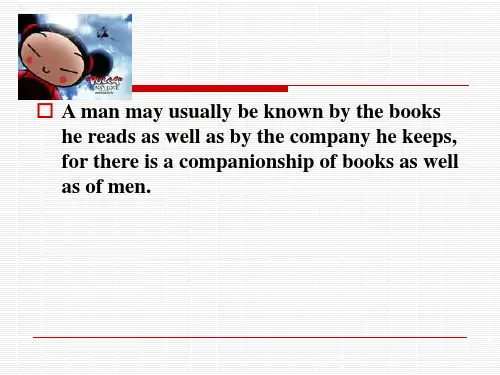
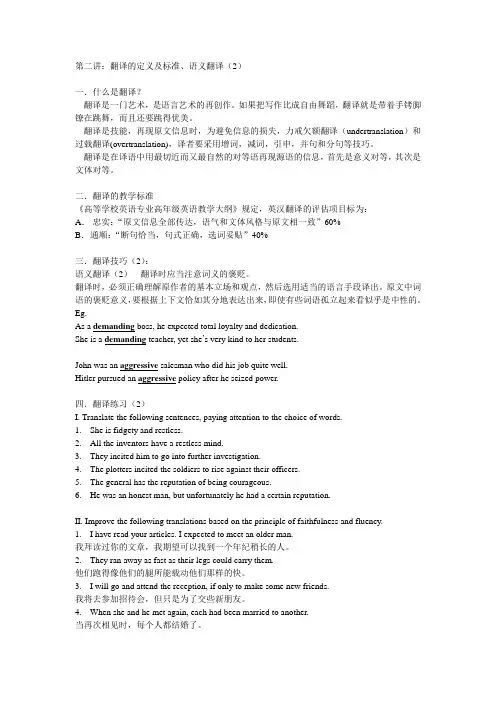
第二讲:翻译的定义及标准、语义翻译(2)一.什么是翻译?---翻译是一门艺术,是语言艺术的再创作。
如果把写作比成自由舞蹈,翻译就是带着手铐脚镣在跳舞,而且还要跳得优美。
---翻译是技能,再现原文信息时,为避免信息的损失,力戒欠额翻译(undertranslation)和过载翻译(overtranslation),译者要采用增词,减词,引申,并句和分句等技巧。
---翻译是在译语中用最切近而又最自然的对等语再现源语的信息,首先是意义对等,其次是文体对等。
二.翻译的教学标准《高等学校英语专业高年级英语教学大纲》规定,英汉翻译的评估项目标为:A.忠实:“原文信息全部传达,语气和文体风格与原文相一致”60%B.通顺:“断句恰当,句式正确,选词妥贴”40%三.翻译技巧(2):语义翻译(2)---翻译时应当注意词义的褒贬。
翻译时,必须正确理解原作者的基本立场和观点,然后选用适当的语言手段译出。
原文中词语的褒贬意义,要根据上下文恰如其分地表达出来,即使有些词语孤立起来看似乎是中性的。
Eg.As a demanding boss, he expected total loyalty and dedication.She is a demanding teacher, yet she’s very kind to her students.John was an aggressive salesman who did his job quite well.Hitler pursued an aggressive policy after he seized power.四.翻译练习(2)I. Translate the following sentences, paying attention to the choice of words.1.She is fidgety and restless.2.All the inventors have a restless mind.3.They incited him to go into further investigation.4.The plotters incited the soldiers to rise against their officers.5.The general has the reputation of being courageous.6.He was an honest man, but unfortunately he had a certain reputation.II. Improve the following translations based on the principle of faithfulness and fluency.1.I have read your articles. I expected to meet an older man.我拜读过你的文章,我期望可以找到一个年纪稍长的人。
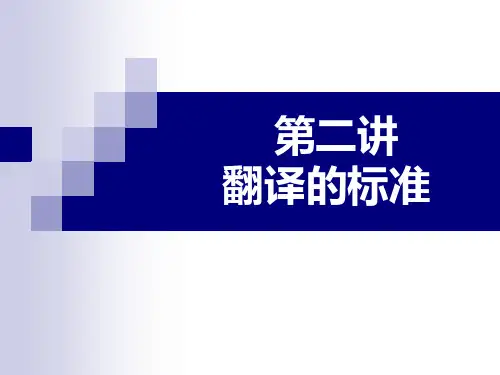
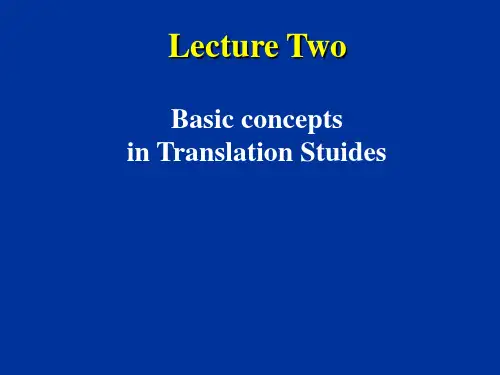
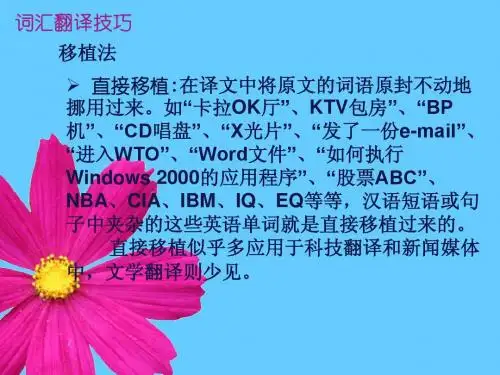
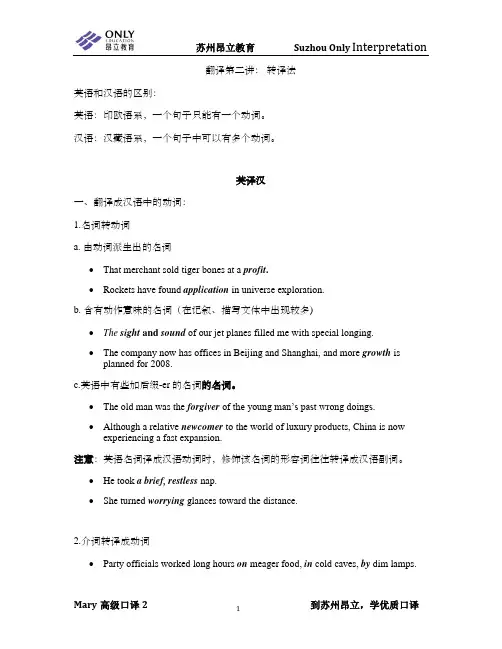
翻译第二讲:转译法英语和汉语的区别:英语:印欧语系,一个句子只能有一个动词。
汉语:汉藏语系,一个句子中可以有多个动词。
英译汉一、翻译成汉语中的动词:1.名词转动词a. 由动词派生出的名词∙That merchant sold tiger bones at a profit.∙Rockets have found application in universe exploration.b. 含有动作意味的名词(在记叙、描写文体中出现较多)∙The sight and sound of our jet planes filled me with special longing.∙The company now has offices in Beijing and Shanghai, and more growth is planned for 2008.c.英语中有些加后缀-er的名词的名词。
∙The old man was the forgiver of the young man’s past wrong doings.∙Although a relative newcomer to the world of luxury products, China is now experiencing a fast expansion.注意:英语名词译成汉语动词时,修饰该名词的形容词往往转译成汉语副词。
∙He took a brief, restless nap.∙She turned worrying glances toward the distance.2.介词转译成动词∙Party officials worked long hours on meager food, in cold caves, by dim lamps.∙“Coming!” Away she skimmed over the lawn, up the path, up the steps, across the veranda, and into the porch.3.形容词转译成动词∙It was a very informative meeting.∙He is not very mindful of personal gains and losses.二、翻译成汉语中的名词:1.名词派生的动词:∙Most satellites are designed to burn up after completing their missions.∙Continuous fighting has mainly characterized their relationship.注意:英语动词译成汉语名词时,修饰该动词的副词往往转译成形容词∙The film “The Sound of Music” impressed him deeply.∙The President had prepared carefully for his journey.2. 有些英语被动式句子中的动词,可以译成“受(遭)到……+名词”、“予(加)以+名词”这类结构。
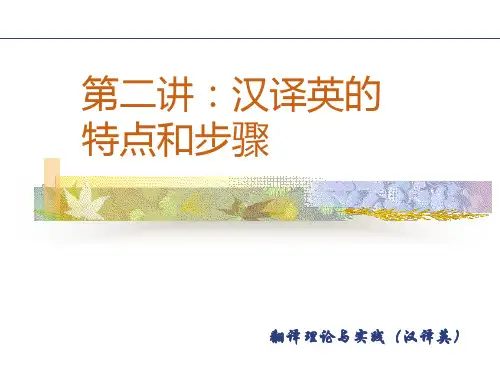
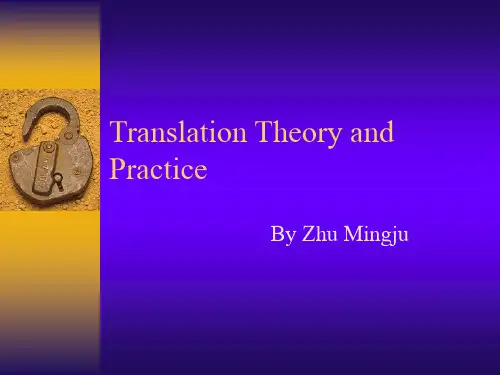
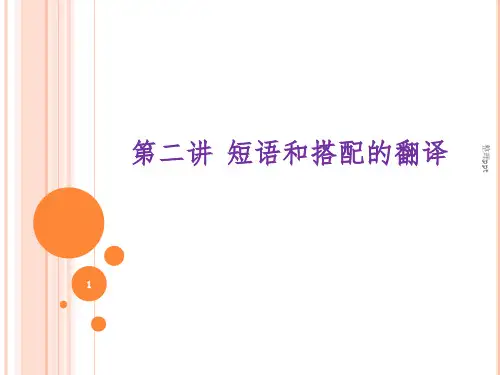
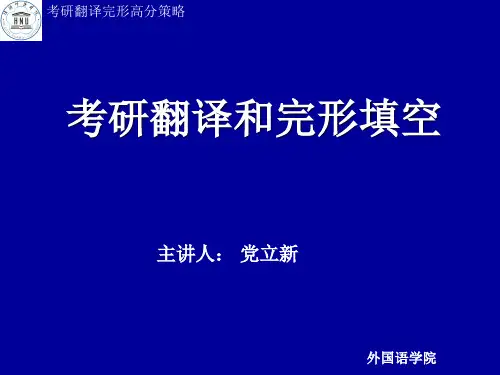
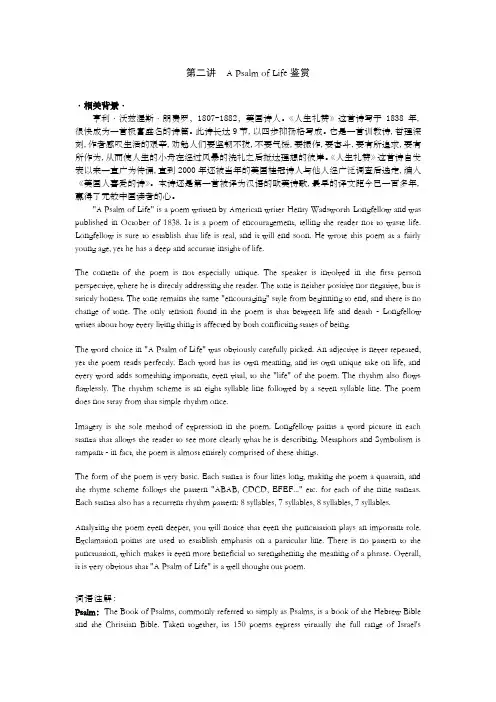
第二讲 A Psalm of Life鉴赏·相关背景·亨利·沃兹渥斯·朗费罗,1807-1882,美国诗人。
《人生礼赞》这首诗写于1838年,很快成为一首极富盛名的诗篇。
此诗长达9节,以四步抑扬格写成。
它是一首训教诗,哲理深刻,作者感叹生活的艰辛,劝勉人们要坚韧不拔,不要气馁,要振作,要奋斗,要有所追求,要有所作为,从而使人生的小舟在经过风暴的洗礼之后抵达理想的彼岸。
《人生礼赞》这首诗自发表以来一直广为传诵,直到2000年还被当年的美国桂冠诗人与他人经广泛调查后选定,编入《美国人喜爱的诗》。
本诗还是第一首被译为汉语的欧美诗歌,最早的译文距今已一百多年,赢得了无数中国读者的心。
"A Psalm of Life" is a poem written by American writer Henry Wadsworth Longfellow and was published in October of 1838. It is a poem of encouragement, telling the reader not to waste life. Longfellow is sure to establish that life is real, and it will end soon. He wrote this poem at a fairly young age, yet he has a deep and accurate insight of life.The content of the poem is not especially unique. The speaker is involved in the first person perspective, where he is directly addressing the reader. The tone is neither positive nor negative, but is strictly honest. The tone remains the same "encouraging" style from beginning to end, and there is no change of tone. The only tension found in the poem is that between life and death - Longfellow writes about how every living thing is affected by both conflicting states of being.The word choice in "A Psalm of Life" was obviously carefully picked. An adjective is never repeated, yet the poem reads perfectly. Each word has its own meaning, and its own unique take on life, and every word adds something important, even vital, to the "life" of the poem. The rhythm also flows flawlessly. The rhythm scheme is an eight syllable line followed by a seven syllable line. The poem does not stray from that simple rhythm once.Imagery is the sole method of expression in the poem. Longfellow paints a word picture in each stanza that allows the reader to see more clearly what he is describing. Metaphors and Symbolism is rampant - in fact, the poem is almost entirely comprised of these things.The form of the poem is very basic. Each stanza is four lines long, making the poem a quatrain, and the rhyme scheme follows the pattern "ABAB, CDCD, EFEF..." etc. for each of the nine stanzas. Each stanza also has a recurrent rhythm pattern: 8 syllables, 7 syllables, 8 syllables, 7 syllables. Analyzing the poem even deeper, you will notice that even the punctuation plays an important role. Exclamation points are used to establish emphasis on a particular line. There is no pattern to the punctuation, which makes it even more beneficial to strengthening the meaning of a phrase. Overall, it is very obvious that "A Psalm of Life" is a well thought out poem.词语注解:Psalm:The Book of Psalms, commonly referred to simply as Psalms, is a book of the Hebrew Bible and the Christian Bible. Taken together, its 150 poems express virtually the full range of Israel'sreligious faith. 《诗篇》(《圣经·旧约》中的一卷。
第二讲:早期的佛经翻译一、关于翻译的早期记载《册府元龟·外臣部·鞮(di2)译》记载,周时有越裳国“以三相胥重译而献白雉,曰:‘道路悠远,山川阻深,音使不通,故重译而朝’”。
《礼记·王制》:“五方之民,言语不通,嗜欲不同。
达其志,通其欲,东方曰寄,南方曰象,西方曰狄鞮,北方曰译。
”这是对翻译官的不同称呼。
后翻译之职,又称“象寄”“象胥”“鞮译”。
又因“夷语与中国相反”,古文把夷语称为“反舌”,而译官又叫“舌人”。
到汉朝,我国主要的外事活动是对北方的匈奴用兵,故翻译活动逐渐用“译”来统称了。
二、佛经翻译活动分期张振玉认为,“佛教之传入中国盖在西汉末年”,那就是公元元年前后。
东汉明帝八年(65年),蔡谙赴天竺取经,两年后,蔡自天竺归,佛经翻译由此开始。
佛经翻译可以分为三个历史时期:第一时期,由东汉末年到西晋,名译家有安清、支谦、支谶、竺法护等。
第二时期自东晋至南北朝,名译家有南方的佛陀跋陀罗、宝云等,北方的昙无谶、鸠摩罗什等。
第三时期,则是唐代,为佛经翻译之大成。
玄奘孤征天竺,研求佛法,历17年;回国后,19年里翻译了佛经73部(相当于25部圣经的分量)。
三、佛经翻译第一阶段(东汉末年到西晋)1.《高僧传》载:汉明帝夜梦金人飞空而至,乃遣博士弟子秦景等往天竺寻访佛法。
……竺法兰,中天竺人也,自言诵经数万章,为中天竺学者之师。
时蔡谙既至彼国,相随间行而至,既达洛阳,便善汉言。
谙于西域获经,即为翻译,所谓……四十二章等五部。
四部失本不传,江左惟四十二章经,今见在。
又有《释老志·序》说,秦景和蔡谙同往天竺求经,后与摄摩腾、竺法兰回洛阳,译四十二章经。
这是最早翻译出来的佛经了。
2.早期佛经翻译的一大特点:很多经书没有书面原本,多为合作翻译的结果。
西域或天竺来的高僧口诵经文,然后由中方人员合译出经文。
3.公元2世纪,安世高译经“义理明晰,文字允正,辩而不华,质而不野”。
(直译与意译)例如:Little fish doesn’t eat big fish.直译:小鱼不吃大鱼意译:胳膊拧不过大腿试译:天有不测风云,人有旦夕祸福to kill two birds with one stoneto flog a dead horsea drop in the bucketto teach a pig to play on a flute门庭若市:The courtyard is like a market. /a much visited house危如累卵:as dangerous as a pile ofeggs/great insecurity; hazardousin the extreme由于文化对语言的影响,有些语言成分只能意译,而不能直译,这主要体现在受本国文化影响最深的成语和谚语上。
hand in glove with:和...狼狈为奸once in a blue moon: 千载难逢乱七八糟:at sixes and sevens (seven disorders and eight chaos)招风惹草:look for trouble (invite wind to exasperate the grass)It is an ill bird that fouls its own nest.外甥打灯笼---照舅(旧)归化与异化(domestication/adaptation orforeignization / alienation)归化的翻译在理论上是把语言看作交际工具;在实践上,强调通俗易懂,避免多义或歧义。
习惯认为,当原文与译文之间因文化差异而出现不能通达的情况时,“要用译语文化替代原语文化”即把在译语中找不到对等的外语词汇改头换面,或套用译语中与之相似的现成的表达法,把它们变成读者熟悉的译语文化形象。
归化派代表人物尤金•奈达(Eugene A. Nida): Functional Equivalence 功能对等“The receptors of the translated text could respond to it with comprehension and appreciation in essentially the samemanner and to the same degree as the original receptors of the message”;“Translation should arouse the same feeling in its receptors as the feeling of the readers of the original”---- NidaFor instance: as white as snow 通常译为白如雪/ 但没有见过雪的人可以将其翻译为“白如白鹭毛”,以达到功能对等的目的。
第二讲英汉词义对比与翻译中根据语境选词一、语境与意义的关系概述词是语言中能自由运用的音义结合体,是构成句子的最基本的单位,所以词的意义直接影响读者对句子甚至对整个篇章的理解。
虽然在翻译的过程中一般以句子为翻译单位,但如果不能把词的意思准确地翻译出来,势必会影响到对整个句子甚至对整个篇章的翻译。
由此可见词在翻译中的重要性。
在选词时,我们除了要注意词的基本含义(概念意义)外,也要明白翻译中的选词更多地受到诸多因素的影响。
语境可分为¡°微观语境(Microcontext)¡±和¡°宏观语境(Macrocontext)¡±,前者主要指词的搭配,包括词组、分句、句、句段、文本或篇章、体裁;后者指非语言因素,即社会、文化、历史因素。
同一个词,在不同的语境中,其涵义、词义广狭、感情色彩、文体色彩、文化色彩等不尽相同。
语境决定词的涵义、词义的广狭、词的感情色彩和语体色彩以及文化涵义等。
翻译时必须将语境纳入考虑之中,仔细斟酌,才能真正取得好的翻译效果。
⏹长期以来,中国学生在学习英语的过程中,尤其在学习英语单词的过程中总喜欢通过其汉语意思记忆单词,久而久之,就形成了一种“怪圈”,即一个英语单词对应一个中文意思(一个汉语词),翻译的时候,往往就会将英语单词与汉语词一一对应起来,结果造成翻译中用词不当的现象。
或者,有时在翻译中遇到不知该如何在目的语中进行表达,只靠单纯地查阅英汉词典或汉英词典,结果发现,英语的汉译文不够通顺,搭配不当,汉语的英译文就让人感觉词不达意。
实际上,英语单词与汉语词并非一一对应的关系,而应根据词所在的语境决定词在上下文中的涵义、词义的广狭、词的感情色彩词、词的语体色彩、词的联想意义等,然后根据这些意义在目的与中选择恰当的对应词(eqiuvalent).⏹Leech(利奇)在《语义学》中列举了七种意义类型:概念意义(conceptual meaning)内涵意义(connotative meaning)风格意义(stylistic meaning)情感意义(affective meaning)联想意义(reflected meaning)搭配意义(collocative meaning)主题意义(thematic meaning)⏹概念意义是意义的中心部分,是客观事物的反映与概括,也就是说,概念意义就是词典里收录的释义,具有约定俗成的特点;内涵意义是词汇的喻义和引申意义,是附加在概念意义之上的意义,不同的语境中,词的内涵意义不尽相同;风格意义指在不同的场合中词汇的运用会呈现不同的层次,不同历史时期、不同的说话人、不同的交际手段和方式等都会影响到词汇的风格意义;情感意义用来表达说话者的感情和态度,取决于词所描述的对象;联想意义是能引起听者或读者联想的意义,有些词可以引起愉快的联想,而有的词可以引起不愉快的联想,尤其是在不同的文化中,词的联想意义有很大的区别。
第2讲英汉对比[补充资料]综合语(synthetic)的特征是运用形态变化来表达语法关系,拉丁语、德语及古英语等都属于综合语。
分析语(analytic)的特征是不用形态变化而用词序及虚词来表达语法关系,汉语是典型的分析语。
现代英语是从古代英语发展出来的,仍然保留着综合语的某些特征,但是也具有分析语的特点:有形态变化,但不像典型的综合语那么复杂;词序笔汉语灵活,但相对固定;虚词很多,用得也相当频繁。
因此,现代英语属于综合-分析语(synthetic- analytic language)。
从语源(Etymology)观来说,英语属印欧语系(Indo-European Language),汉语则属汉藏语系(Sino-Tibetan language)。
(一)形合与意合:英语重形合(hypotaxis),汉语重意合(parataxis)所谓形合,指的是句中的词语或分句之间用语言形式手段(如关联词)连接起来,表达语法意义和逻辑关系。
意合指的是词语或分句之间不用语言形式手段连接,句中的语法意义和逻辑关系通过词语或分句的含义表达。
英语造句常用各种形式手段连接词、短语、分句或从句,注重显性接应(overt-cohesion),注重句子形式,注重结构完整,注重以形显义。
英语句中的连接手段和形式(cohesive ties)不仅数量大,种类多,而且用得十分频繁。
汉语造句少用甚至不用形式连接手段,注重隐性连贯(covert-coherence),注重逻辑事理顺序,注重功能、意义,注重以神统形。
(汉语介词数量少,大约30个,大多从动词“借”来的。
)1)When I try to understand what it is t hat prevents so many Americans from being as happy as one might expect, it seems to me that there are two causes, of which one goes much deeper than the other. (关系词和连接词)为什么如此众多的美国人不能如想象中那样幸福呢?我认为原因有二,而两者之间又有深浅之分。
翻译第二讲分合译法(2)翻译英语句子时,在不少情况下需要将原来的句子结构作较大的调整。
分句法(division)和合句法(combination)是改变原文句子结构的两种重要法方法。
所谓分句法是指把原文的一个简单句译成两个或两个以上的句子。
合句法是指把原文中两个或两个以上的简单句或一个复合句在译文中用一个单句来表达。
一、分句法(一)把原句中的一个单词译成句子,使原文中的一个句子分译成两个或两个以上的句子。
:1.副词→单句1)Developing countries seemed justifiably proud of their economic achievements.发展中国家似乎为他们在经济上取得的成绩而自豪,这是合乎情理的。
2)Those Chinese scientists in Silicon Valley are understandably proud of their achievements.这些在硅谷工作的科学家对他们取得的成就感到很自豪,这是可以理解的。
3)Incidentally, I hope to get better medical treatment in other countries than I can possibly get here in the Unite States.顺便提一下,我希望能在这些国家得到比我在美国这里所能得到的更好的治疗。
4)They,not surprisingly, did not respond at all.他们根本没有答复,这是不足为奇的。
2.形容词→单句1)A naive projection of their past growth rates into the future was likely to greatly over-state their real prospects.若以过去的增长率来预测未来,会显得考虑欠妥,因为那种预测会严重夸大未来的实际增长。